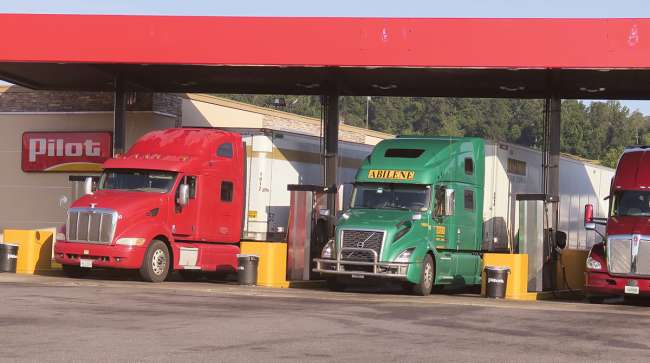Senior Reporter
Diesel Falls 3.1¢ to $2.851 Per Gallon

[Stay on top of transportation news: Get TTNews in your inbox.]
The U.S. average retail price of diesel fell 3.1 cents to $2.851 per gallon, the Department of Energy reported March 2.
Oil prices started to climb back up after central bankers from around the world offered reassurances they will take stabilization measures as the coronavirus disrupts economic activity, Bloomberg News reported.
Trucking’s main fuel costs 22.5 cents less than it did a year ago, when it was $3.076 a gallon, according to DOE.
U.S. average on-highway #diesel fuel price on 3/02/2020 was $2.851/gal, DOWN 3.1¢/gallon from 2/24/2020, DOWN 22.5¢/gallon from year ago https://t.co/BPpiuGp63f #truckers #shippers #fuelprices pic.twitter.com/shz3BsO2bA — EIA (@EIAgov) March 3, 2020
All regional diesel prices fell, and dropped the most, 5 cents per gallon, in California.
The U.S. average price of a gallon of gasoline fell 4.3 cents to $2.423 per gallon, according to DOE’s Energy Information Administration. It was 0.1 cent higher compared with a year earlier.
Average gasoline prices fell in all regions.
U.S. average price for regular-grade #gasoline on 3/02/2020 was $2.423/gal, DOWN 4.3¢/gallon from 2/24/2020, UP 0.1¢/gallon from year ago https://t.co/4zR3LRFsfF #gasprices pic.twitter.com/fwCRicZzsc — EIA (@EIAgov) March 3, 2020
West Texas Intermediate crude futures on the New York Mercantile Exchange closed at $47.13 on March 2 compared with $51.43 per barrel Feb. 24.
At the same time, anxiety remains over the effect of the virus on global business conditions.
Bloomberg reported the Organization for Economic Co-operation and Development warned economic growth may sink to levels not seen in more than a decade as the coronavirus that emerged in China late last year wreaks havoc on manufacturing, consumer demand and transport.
In Superior, Wis., a city of 26,000 along the shore of Lake Superior, company executive Dean Brickson with Jeff Foster Trucking told Transport Topics that the retail price of diesel in his community is $2.95 a gallon.
That’s the lowest it has been in months.
And while that is good news in many respects, there are some benefits to higher diesel prices. The guarantee trucking companies have of a fuel surcharge assures a certain amount of additional revenue will be coming into the company every month when the change is passed along to the customer. In this case, Brickson said Jeff Foster trucks’ 160 power units are receiving 36 cents per mile from the surcharge.
“A fuel surcharge, when fuel prices are high, is a nice little profit center for us,” said Brickson, whose fleet operates flatbeds and dry vans. “So this is sort of a layered onion for us. The fuel [surchage] hasn’t been eliminated for more than a decade.”
Fuel surcharges have been around in the trucking industry since 1973 and the Arab oil embargo. They were put on hiatus during the 1980s but returned in the mid-1990s when oil prices spiked. Today, the U.S. Department of Energy computes the weekly cost of diesel, and fuel surcharge schedules are based off of the national average of diesel for the week.
“[Fuel charges] are kind of a double-edged sword. You’d think when fuel was closer to $5 a gallon companies would suffer. But in fact, they’re able to profit on it, a lot like airline surcharges, or baggage or seat assignments in terms of profit centers for companies,” Brickson added.
While diesel is lower than it was at this point last year, one analyst told TT there is the possibility that oil and refined products such as diesel, gasoline and jet fuel will rally later in the year.

Flynn
“With the coronavirus, you would think they would be going down a little bit,” said Phil Flynn, a senior energy analyst at The Price Futures Group. “I think we’re going to start going higher with diesel prices from where we are now. I know this is counterintuitive because of all of the demand destruction. But I think because of the belief we are going to get through this coronavirus, I think the market is going to start to creep back up again.”
Flynn said energy prices typically begin to increase in the spring as demand for gasoline and diesel usually expands. He expects that trend to continue in 2020, even as most economists predict slower economic growth in the first quarter. He said he would not be surprised if diesel increases 3 to 5 cents in the next month.
“As we look forward, the news might get worse before it gets better, but we think ultimately, it’s going to get better,” Flynn stated. “So, there is no doubt if people stop traveling and it grows, it will have a dampening effect on the price. But I don’t think the dampening effect will stop a modest increase in the next three weeks.”
Senior Reporter Roger Gilroy contributed to this report.
Want more news? Listen to today's daily briefing:




